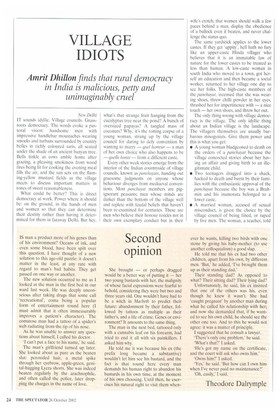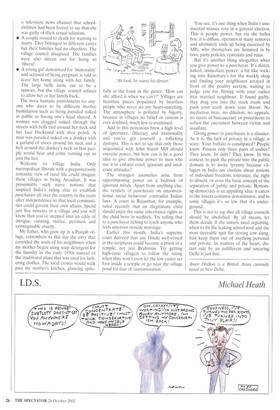VILLAGE IDIOTS
Amrit Dhillon finds that rural democracy
in India is malicious, petty and unimaginably cruel
New Delhi IT sounds idyllic. Village councils. Grassroots democracy. The words evoke a pastoral vision: handsome men with impressive handlebar moustaches wearing smocks and turbans surrounded by country belles in richly coloured saris, all seated under the shade of an ancient banyan tree. Bells tinkle as cows amble home after grazing, a pleasing smokiness from wood fires being lit for cooking the evening meal fills the air, and the sun sets on the flaming-yellow mustard fields as the village meets to discuss important matters in tones of sweet reasonableness.
What could be better? This is direct democracy at work. Power where it should be: on the ground, in the hands of men and women so that they can determine their destiny rather than having it determined for them in faraway Delhi. But hey. what's that strange fruit hanging from the eucalyptus tree near the pond? A bunch of oversized papayas? A tangled mass of coconuts? Why, it's the rotting corpse of a young woman, strung up by the village council for daring to defy convention by wanting to marry — quel horreur — a man of her own choice who also happens to be quelle honte — from a different caste.
Every other week stories emerge from the interior of the Indian countryside of village councils, known as panchayats, handing out gruesome judgments on anyone whose behaviour diverges from mediaeval conventions. Most panchayat members are pigignorant peasants; men whose minds are darker than the bottom of the village well and replete with feudal beliefs that haven't been re-examined for centuries. These are men who believe their honour resides not in their own exemplary conduct but in their wife's crotch; that women should walk a few paces behind a man, display the obedience of a bullock even if beaten, and never challenge the status quo.
The same yardstick applies to the lower castes. If they get 'uppity', hell hath no fury like an upper-caste Hindu villager who believes that it is an immutable law of nature for the lower castes to be treated as less than human. A low-caste woman in south India who moved to a town, got herself an education and then became a social worker, returned to her village one day to see her folks. The high-caste members of the panchayat, incensed that she was wearing shoes, threw chilli powder in her eyes, thrashed her for impertinence with — a nice touch — her own shoes, and threw her out.
The only thing wrong with village democracy is the village. The only idyllic thing about an Indian village is the landscape. The villagers themselves are usually barbarous misogynists. Give them power and this is what you get: • A young woman bludgeoned to death on the orders of a panchayat because the village concocted stories about her having an affair and giving birth to an illegitimate child.
• Two teenagers dragged into a shack, hacked to death and burnt by their families with the enthusiastic approval of the panchayat because the boy was a Brahmin and his inamorata belonged to a lower caste.
• A married woman, accused of sexual misconduct, is given the choice by the village council of being fined, or raped by five men. The woman, a teacher, told a television news channel that schoolchildren had been forced to say that she was guilty of illicit sexual relations.
• A couple stoned to death for wanting to marry. They belonged to different castes but their families had no objection. The village council disagreed. The families were also driven out for being so 'liberal'.
• A young girl denounced for 'immorality' and accused of being pregnant is told to leave her home along with her family. The large belly turns out to be a tumour, but the village council refuses to allow her or her family back.
The more humane punishments for anyone who dares to be different involve humiliation such as being paraded naked in public or having one's head shaved. A woman was dragged naked through the streets with bells tied around her neck and her face blackened with shoe polish. A man was paraded naked on a donkey with a garland of shoes around his neck and a bell around the donkey's neck so that people would hear and come running out to join the fun.
Welcome to village India. Only metropolitan liberals with a preposterously romantic view of rural life could imagine these villages as being Arcadian. It was presumably such naive notions that inspired India's ruling elite to establish panchayats all over the country in the years after independence so that local communities could govern their own affairs. Spend just five minutes in a village and you will know that you've stepped into an eddy of intrigue, cunning, malice, pettiness and unimaginable cruelty.
My father, who grew up in a Punjab village, remembers to this day the envy that corroded the souls of his neighbours when my mother began using soap detergent for the laundry in the early 1930s instead of the traditional plant that was used for lathering clothes. The local crones would walk past my mother's kitchen, glancing spite fully at the foam in the gutter. 'How can she afford it when we can't?' Villages are heartless places populated by heartless people who never do any heart-searching. The atmosphere is polluted by bigotry, because in villages no belief or custom is ever doubted, much less re-examined.
Add to this poisonous brew a high level of ignorance, illiteracy and irrationality and you've got yourself a rollicking dystopia. This is not to say that only those acquainted with John Stuart Mill should exercise power. but how can it be a good idea to give absolute power to men who use it to enforce cruel, ignorant and intolerant attitudes?
The strangest anomalies arise from superimposing power on a bedrock of ignorant minds. Apart from anything else, the verdicts of panchayats on unconventional social behaviour contradict Indian laws. A court in Rajasthan, for example, ruled recently that an illegitimate child should enjoy the same inheritance rights as the child born in wedlock. Try telling that to a panchayat itching to lynch anyone who feels amorous outside marriage.
Earlier this month, India's supreme court decreed that any Hindu well-versed in the scriptures could become a priest in a temple, not just Brahmins. Try getting high-caste villagers to follow the ruling when they won't even let the low castes set foot inside a temple or go near the village pond for fear of 'contamination'. You see, it's one thing when India's uneducated masses vote in a general election. This is people power, but via the ballot box: it is diffuse, operates at many removes and ultimately ends up being exercised by MPs, who themselves are hemmed in by laws, party policies, restraints and rules.
But it's another thing altogether when you give power to a panchayat. It's direct, naked, immediate power; a bit like walking into Sainsbury's for the weekly shop and finding your neighbours arrayed in front of the poultry section, waiting to judge you for flirting with your rather nice married neighbour. If found guilty, they drag you into the stock room and push your teeth down your throat. No mediation here, no dilution, no appeals, no layers of bureaucracy or procedures to soften the encounter between victim and assailant.
Giving power to panchayats is a disaster. As it is, the lack of privacy in a village is scary. Your buffalo is constipated? People know. Possess only three pairs of undies? They know. In debt? They know. In this context, to push the private into the public domain is to invite tyranny because villagers in India are clueless about notions of individual freedom, tolerance, the right to dissent, or even the basic concept of the separation of public and private. Bottomup democracy is an appalling idea: it caters to the lowest common denominator, and in some villages ifs so low that it's underground.
This is not to say that all village councils should be abolished. By all means, let them decide if the sewers need repairing, when to fix the leaking school roof and the most desirable spot for storing cow dung. Just keep them out of anything personal and private. In matters of the heart, distant rule by an indifferent and uncaring Delhi is just fine.
Amrit Dhillon is a British Asian currently based in New Delhi.



















































































 Previous page
Previous page